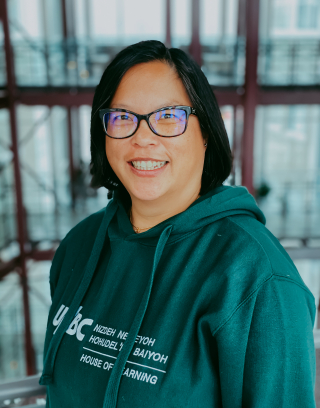

EDUC 431 – November 5, 2019 – REFLECTION
Thank you Janet Chow for being THE CLOSER of my EDUC 431 EdTech class. You were AMAZING. I’d like to say that you’re small, but fierce. I LOVED your willing to teach and LEARN with us as you video conferenced from Burnaby to share your thoughts and expertise on EdTech with my Year 2 Teacher Candidates at UNBC. Sometimes I think it’s serendipity, sometimes I think… “hey, I planned that.” I think it’s the former rather than the latter. You were so eloquent… and PATIENT with our tech issues… you were able to capture the big ideas of PURPOSE, BC’s Curriculum, and Assessment in one short hour.
I love how you got me to make MAKER BAGS for my class. I’ve participated in a maker space activity at the Small School Think Tank in 2018 and I was super amazed by the process of making to help collaborative groups cooperate, co-create, and synthesize what we had learned and what we wanted to do next. Each maker item had a STORY. This was the underpinning of Janet’s presentation… THE POWER OF STORY… which by the way, she co-moderated #bcedchat the Sunday before talking about the use of story for teaching and learning. I thought her presentation was timely and personally relevant. It captured her values about EdTech but also about teaching and learning.




Instead of concluding a professional learning session with maker space, Janet started her presentation with students answering this question: “Build you hopes, wishes, dreams as an educator. What is your story?” In small groups, students took the time to empty the maker bags and co-construct their story. This is something that students could write about in their blog reflections or share what they had created via Twitter. What I found so fascinating about this learning activity is that this was the first time that she facilitated this learning activity remotely via video conferencing (and relying on me to help her facilitate face to face). It worked brilliantly and I just loved that she was willing to take the risk to try. Admirable.
Here are a few examples of what was shared on Twitter:
Thank you @JanetChowMSc for sharing your knowledge with @EducationUnbc year 2 students! Prompt: Build your hopes, wishes, dreams as an educator| Can you guess our answer…?| Continued growth through ALL situations! #unbced #bcedchat pic.twitter.com/il4lIrMF5L
— Kyra Sinclair (@sinclair_kyra) November 6, 2019
@JanetChowMSc #unbced #ed431 Here Is a visual of my group's fire starter. Instead of creating a model, we chose to create a visual of our hopes, dreams, and wishes as an educator. Included: inclusivity, place based and experiential learning, and child centered learning. pic.twitter.com/G8lo6ACr9o
— Carlo Bellisomo (@BellisomoCarlo) November 6, 2019
@JanetChowMSc @ChristineYH interconnected of globe and place. Rooted in place, growth mindset and forward thinking. Always emotionally aware. Great fire starter session in #educ431 #unbced @TTS_Teaches @stkellington pic.twitter.com/b1kZNRNvmf
— jordan hall (@jordanlynh) November 6, 2019
My structure represents my hopes, dreams, and wishes as a future educator. beads- my accomplishments
paper clips- challenges
happy faces-end goal to have my own family someday:) @JanetChowMSc @EducationUnbc pic.twitter.com/MH7frN9cTF— Gagan Vaid (@GaganVaid11) November 6, 2019
Janet was the perfect CLOSER. She seemed to have summarized the course, highlighted the big ideas about EdTech and it’s purpose to support student learning by being a vehicle for students to create and express themselves, and made connections to BC’s Curriculum and formative assessment. By doing this, Janet was able to tie in other courses into this EdTech course to show that everything that we are doing via teaching and learning are interconnected. You’ve got us thinking about EdTech and why it is an important teaching and learning tool to include all students but also help students. Thank you Janet for coming to our EDUC 431 class to share your knowledge, excitement, and expertise in EdTech.
Janet’s Blog from SD41: https://blogs.sd41.bc.ca/learningtech/






 EDUC 431 – October 22, 2019 – REFLECTION
EDUC 431 – October 22, 2019 – REFLECTION














 Of course I had to get a selfie of us. I want to start a trend… selfies can be taken in person and virtually. It’s all good. Thank you for sharing your knowledge, expertise, and excitement for EdTech with us. You spoke of other ideas such as parent permission and informed consent, other applications such as MindCraft and Virtual Reality, and blogging. I really liked what you said… ADVOCATE, EDUCATE, AND ACCOMMODATE. 🙂
Of course I had to get a selfie of us. I want to start a trend… selfies can be taken in person and virtually. It’s all good. Thank you for sharing your knowledge, expertise, and excitement for EdTech with us. You spoke of other ideas such as parent permission and informed consent, other applications such as MindCraft and Virtual Reality, and blogging. I really liked what you said… ADVOCATE, EDUCATE, AND ACCOMMODATE. 🙂

































